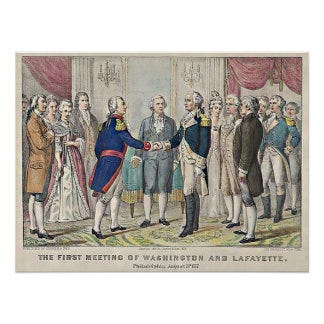Would George Washington support Ukraine or Russia?
Would George Washington side with Ukraine or Russia?

At the start of Washington’s presidency, the French Revolution broke out in France. Many, including his Secretary of State Thomas Jefferson, wanted him to support France openly and publicly because the French king had been an ally during the American Revolution. In fact, Washington would not have won the Battle of Yorktown in 1781, the last major battle of the American Revolution, without four regiments from France and French ships that blocked the British by sea.
During the French Revolution, the courts of Europe came to the aid of France's King Louis XVI and allied themselves against the revolutionaries and Jacobins in France. Tensions increased between revolutionary France and England. Back in America, some advisors wanted Washington to side with England.
Washington chose neutrality. He knew America was not strong enough militarily or economically to support any European nation over another, even an ally like France. Washington held an America first point-of-view when he analyzed foreign policy.
As he said goodbye to America as president in his Farewell Address in 1796, Washington warned Americans against picking sides with other nations, especially during conflict. Why? He feared taking sides would corrupt America.
“As avenues to foreign influence in innumerable ways, such attachments are particularly alarming to the truly enlightened and independent patriot. How many opportunities do they afford to tamper with domestic factions, to practice the arts of seduction, to mislead public opinion, to influence or awe the public councils! Such an attachment of a small or weak, towards a great & powerful nation, dooms the former to be the satellite of the latter.”
Washington felt an urgency to convey the wisdom of neutrality when America's national security interests were not at stake. He strongly advised Americans to stay vigilant, to stay awake against the schemes of those who would corrupt United States government officials and political parties through foreign influence.
“Against the insidious wiles of foreign influence (I conjure you to believe me fellow citizens) the jealousy of a free people ought to be constantly awake; since history and experience prove that foreign influence is one of the most baneful foes of Republican Government.”
Washington had witnessed corruption of royal governors during the American Revolution. He had also witnessed democratic societies pop up throughout the United States during the French Revolution. These societies divided Americans into two groups: pro-England vs. pro-France, which greatly concerned Washington.
“Excessive partiality for one foreign nation and excessive dislike of another, cause those whom they actuate to see danger only on one side, and serve to veil and even second the arts of influence on the other. Real Patriots, who may resist the intrigues of the favourite, are liable to become suspected and odious; while its tools and dupes usurp the applause & confidence of the people, to surrender their interests,” Washington warned.
He advised Americans against favoring one nation over another. He feared that political parties would be corrupted by foreign influence.
Given Washington's neutrality toward France and England, very likely Washington would try seek a neutral position when it comes to Ukraine and Russia. This doesn't mean he would not be sympathetic to the suffering of Ukrainian people, both by the Russians and by the neo-nazi militia. Quite the contrary. He would want freedom for the Ukrainian people.
Washington was anguished during the French Revolution when he could no longer communicate with the Marquis de Lafayette, who had served as a general under Washington during the American Revolution.
Even though Lafayette had supported the French Revolution at the beginning in 1789, his status as a wealthy member of the nobility led the Jacobins to turn on him and arrest him. Considering Lafayette to be like a son to him, Washington wrote Lafayette's wife in his private capacity, not in his public capacity as president. He sent financial assistance to her in his private capacity and tried to send an intermediary to get Lafayette out of prison. Lafayette was eventually freed.
Likewise, when President Washington realized that the French revolutionaries had turned on their own ambassador to America, Washington showed this French diplomat mercy despite the many political problems this Frenchman had caused him. Washington knew if he sent this ambassador back to France, the man would face the guillotine, just like Queen Marie Antoinette. Instead, Washington gave the man permanent asylum in America.
Unless America's national security interests are at stake, and a case has not been made for that because Ukraine is not a member of NATO, President Washington would seek a neutral position when it came to Ukraine and Russia's invasion. He would seek to understand both sides of the conflict that started in 2014. He would be concerned about Putin's aggression but also about corruption in Ukraine. He would be concerned about the dangers of biological research. He would be concerned about the corruption of the Biden family. President Biden's son, Hunter Biden, was on the board of the Ukrainian energy company, Burisma, which shows that the Biden family had financial interest in Ukraine. Washington warned about the moral depravity that comes when someone is under influence of a foreign power or is bribed.
Washington would be concerned about the Ukrainians and Russian-speaking Ukrainians in the east being caught in the crossfire.
More than anything, George Washington would not want a foreign conflict to divide Americans. Our unity as Americans would be paramount to him.




